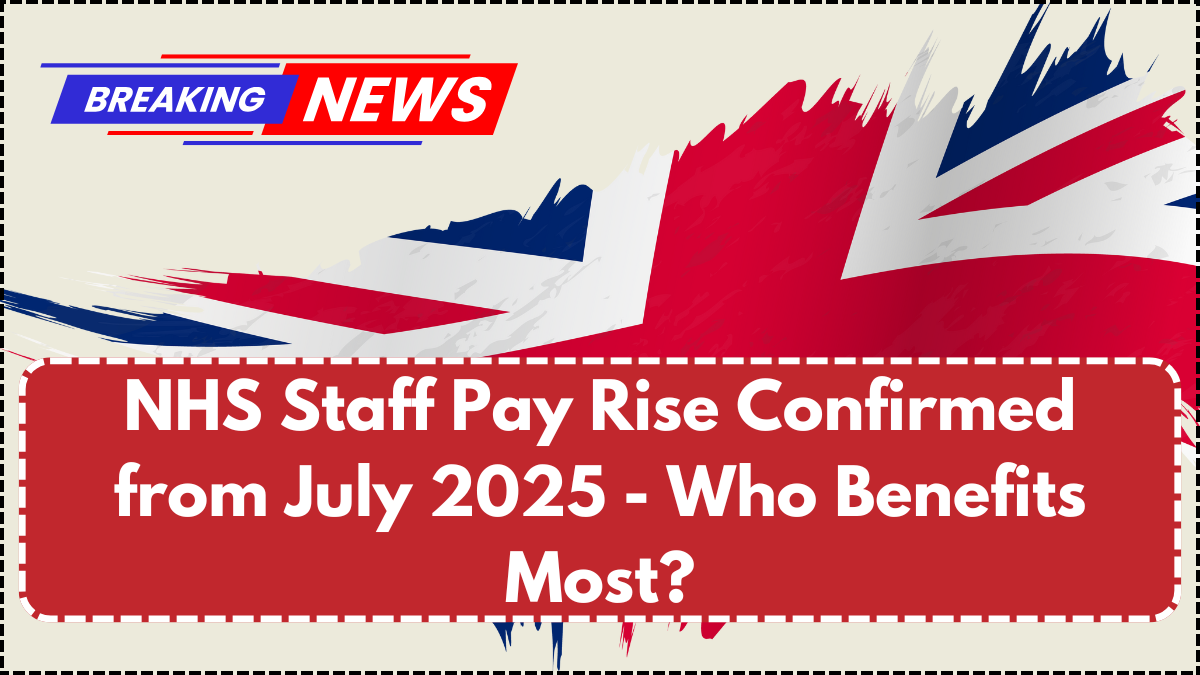The UK Government has confirmed a new NHS pay rise 2025, set to take effect from July. This announcement impacts over a million workers in the National Health Service, spanning clinical and non-clinical roles. While the headline figures are grabbing attention, a closer look reveals how different staff groups benefit in varied ways. As the health sector continues to face workforce challenges, this salary adjustment plays a crucial role in retention and morale.

Overview of the NHS Pay Deal 2025
From July 1, 2025, all NHS workers covered under Agenda for Change will see an increase in their wages. The average uplift ranges from 5% to 7%, depending on the role and experience level. Senior nurses, paramedics, midwives, and certain technical staff are among the biggest gainers, reflecting growing demands and skill shortages in these roles.
The table below outlines the estimated wage increase across key roles:
| Staff Category | Average Current Salary | % Increase | New Average Salary (Estimated) |
|---|---|---|---|
| Band 5 Nurse | £28,407 | 6.5% | £30,258 |
| Band 6 Paramedic | £35,392 | 7.0% | £37,870 |
| Band 7 Midwife | £43,742 | 6.8% | £46,712 |
| Admin Band 3 | £21,730 | 5.0% | £22,816 |
| Band 8a Manager | £51,094 | 5.5% | £53,904 |
Who Gains the Most from the NHS Wage Hike?
Specialist and frontline clinical staff appear to benefit most from the 2025 adjustments. Band 6 and Band 7 roles, which include experienced nurses, paramedics, and midwives, are seeing higher-than-average boosts. This is a strategic move by the government to address high attrition rates and workforce gaps.
Non-clinical staff like administrative workers and porters are also receiving increases, albeit at a slightly lower rate. These groups have long been part of the healthcare ecosystem, and while the pay boost is welcome, some unions argue that it doesn’t go far enough to match the cost-of-living spike.
The Broader Impact on the UK Health Sector Salary Landscape
The UK health sector salary framework is under increasing pressure. With inflation rising and private healthcare attracting more professionals, the NHS has had to react decisively. The 2025 pay hike is not only a financial gesture but also a political and operational one aimed at restoring confidence in the public health system.
The rise follows months of negotiations between the Department of Health and trade unions. While some sectors are satisfied, others continue to push for additional reviews, especially for mental health professionals and allied health workers.
Funding and Long-Term Viability
Funding for this wage increase comes from a combination of reallocated departmental budgets and increased Treasury support. However, health economists warn that while a one-off rise is helpful, sustained annual reviews are necessary to keep pace with both market and inflationary pressures.
Recruitment drives in June 2025 already reflect a more positive outlook, with job postings seeing a 14% increase compared to the same time last year. If the NHS wage hike continues as part of a long-term workforce strategy, it could strengthen the NHS’s position in a highly competitive labour market.
NHS Pay Rise 2025: What to Expect Next?
As July approaches, staff are being notified of their new pay rates, and updated payslips are expected by the end of the month. HR departments across NHS trusts are actively updating payroll systems to reflect the new structure.
Trade unions have stated that while this round of increases is a step forward, future pay deals must go further in aligning NHS compensation with the workload, especially in emergency departments and rural care units.
FAQs
When does the 2025 NHS pay rise take effect?
The new pay rates will be applied starting July 1, 2025, with updated payments visible in the July payroll cycle.
Who is eligible for the NHS pay rise 2025?
All staff under Agenda for Change, including nurses, paramedics, midwives, administrative staff, and technical workers, are eligible.
How does the 2025 NHS wage hike compare to previous years?
This year’s increase is notably higher than the 2024 rise, reflecting both inflation and strategic workforce needs.
Will this pay rise affect future recruitment?
Yes, early indicators in June 2025 suggest increased interest in NHS roles, particularly among younger healthcare professionals.
Are non-clinical staff included in the NHS pay rise?
Yes, although their percentage increase is generally lower than clinical staff, all Agenda for Change roles receive a boost.
Click here to learn more
Aanchal is a passionate writer with a keen interest in storytelling, content creation, and creative expression. She enjoys exploring diverse topics and crafting engaging narratives that captivate readers.



